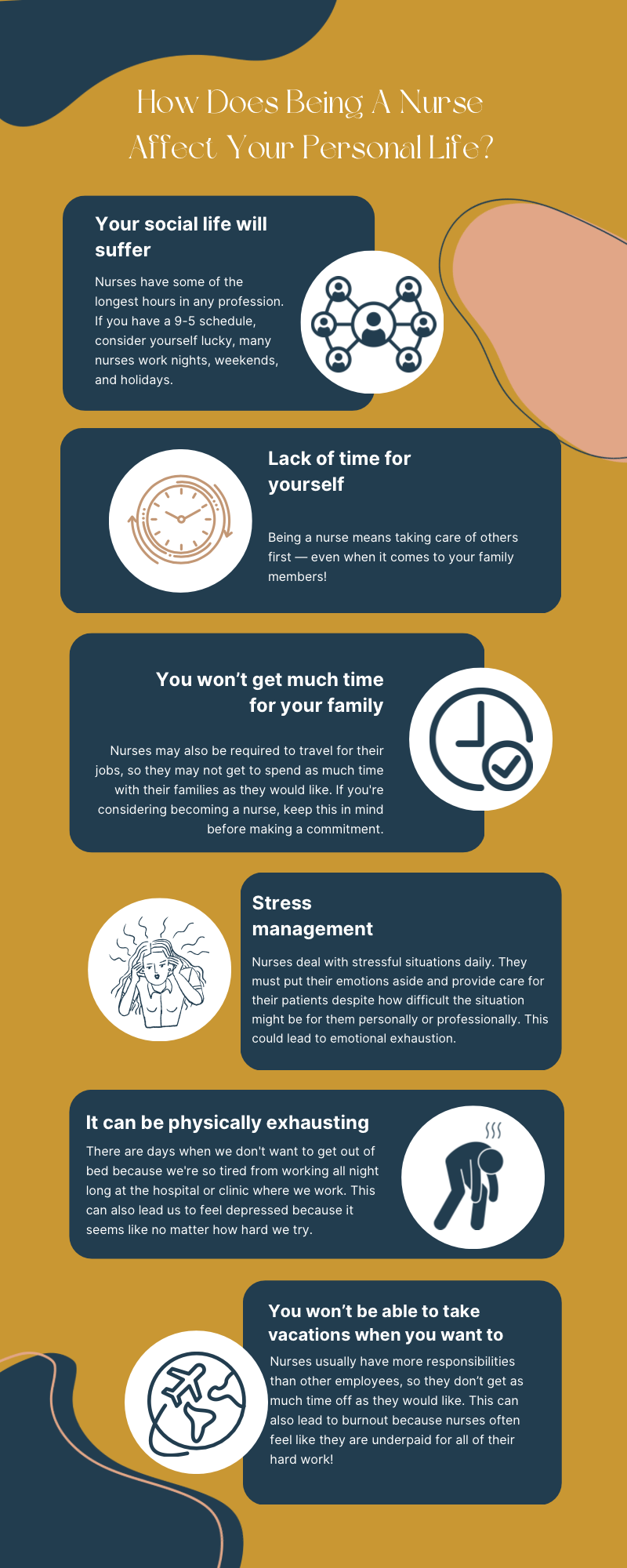
Have you ever wondered how being a nurse impacts your personal life?
Nurses have a very difficult job—they are constantly on the go, they have to be at the hospital whenever they're needed, and they have to put their patients first.
In fact, studies have shown that job stress negatively affects the health and quality of life of nurses.
The stress that comes with being a nurse can take its toll on their personal lives—their relationships, their health, even their mental state. But it's not all doom and gloom!
In this article, we will look at why nurses often have a hard time balancing their professional obligations with their personal ones.
We'll also talk about ways that nurses can make sure they always have time for themselves and their loved ones.
How Does Being A Nurse Affect Your Personal Life?

Nursing is a rewarding career, but it's not without its challenges.
The hours can be long and unpredictable, the work can be stressful, and the pay isn't always what you'd like it to be. In fact, 60% of nurses reported that they have a moderate level of quality of working life.
But if you're passionate about helping others, all of that can be secondary to your goal of helping people get better and live longer lives.
But even if you love what you do, there are still sacrifices that come with being a nurse. Here are some ways being a nurse affects your personal life:
1) Your social life will suffer
Nurses have some of the longest hours in any profession. If you have a 9-5 schedule, consider yourself lucky — many nurses work nights, weekends, and holidays.
And even if you aren't working those hours now, chances are good that at some point in your career, you'll find yourself working overtime or covering for other nurses who need to take time off for family emergencies or vacations.
2) Lack of time for yourself
Being a nurse means taking care of others first — even when it comes to your family members!
If something happens with your spouse or kids while they're under your care (and it will), you won't be able to leave their side until they've received adequate care from another healthcare professional.
3) You Won’t Get Much Time For Your Family
Nurses may also be required to travel for their jobs, so they may not get to spend as much time with their families as they would like.
If you're considering becoming a nurse, keep this in mind before making a commitment.
4) Stress management
Nurses deal with stressful situations daily. They must put their emotions aside and provide care for their patients despite how difficult the situation might be for them personally or professionally.
This could lead to emotional exhaustion and burnout if not properly managed over time.
5) It can be physically exhausting!
There are days when we don't want to get out of bed because we're so tired from working all night long at the hospital or clinic where we work.
This can also lead us to feel depressed because it seems like no matter how hard we try, there's always more work for us to do in order for our patients to get better faster or just stay healthy in general!
6) You won’t be able to take vacations when you want to
Nurses usually have more responsibilities than other employees, so they don’t get as much time off as they would like.
This can also lead to burnout because nurses often feel like they are underpaid for all of their hard work!
How Do Nurses Balance Work And Home Life?

Now that you know how nursing can affect your personal life. Let’s discuss some ways you can strike a balance between work and home life.
I'm not talking about the "work-life" balance that's often discussed in the general media.
Instead, I'm talking about the day-to-day balancing act that nurses must perform between their professional duties and their family responsibilities.
As a nurse on the front lines of healthcare, I've seen how this balancing act can affect not just nurses but also patients and families.
When nurses are overworked or stressed out, it can lead to burnout and even job dissatisfaction — which can then affect patient care.
So how do nurses strike a balance between work and home life? Here are some ways:
1) Find Time For Yourself
The American Nurses Association says that the average nurse works 12-hour shifts, but many work longer.
However, nurses need to find time for themselves, so they don't get burnt out from working long hours. You can go for a walk after work or take some time off on weekends to relax at home.
You can also set aside some time during your break at work for yourself instead of rushing through it just because you feel you don't have enough time.
If possible, take a short nap during lunchtime, which will help refresh you after a busy morning shift at work.
2) Schedule enough vacations
Nurses need time off to recharge their batteries! Don’t be afraid to schedule a vacation — even if it’s just a weekend away.
If you don’t take any time off for yourself, you won’t be able to give your best at work or at home.
3) Don’t Bring Your Work To Home
Try not to bring your work problems home with you, and don't take your frustrations out on others in your family or among friends.
If something is bothering you at work, talk to someone about it rather than letting it build up inside of you until it explodes at home or among friends.
4) Know your limits as an individual
As a nurse, it is important for you to know when you are at your limit when it comes to working at the hospital or clinic.
It is essential that you take time off from work when needed so that you do not become exhausted and stressed out from your job.
You should never feel like you have to sacrifice your personal life for work demands, so make sure that you are always taking care of yourself first before anything else comes into play!
5) Let go of perfectionism (and embrace flexibility)
Nurses are often perfectionists who want to do everything right the first time.
But this attitude can lead to frustration when things don’t go according to plan, which can lead to burnout and even leave you exhausted and irritable at home.
If something needs to be done twice because of human error, don’t beat yourself up over it!
Permit yourself to make mistakes — everyone does — and remember that practice makes perfect!
6) Set aside quality time with family members
Nurses can’t always be present for every event at home, but you do need to set aside some quality time with your loved ones — especially if your schedule isn’t predictable from week to week.
Set aside one day each week (or two) when you can spend uninterrupted time together as a family, whether it’s going out for dinner or taking a trip somewhere.
Advantages and Disadvantages of Being A Nurse

Nursing is one of the most rewarding and fulfilling jobs in the world. Nurses have the opportunity to help people in their most vulnerable moments and are valued for their years of experience and compassion.
However, there are also some downsides to being a nurse. Some nurses may find themselves feeling overworked or stressed due to the high expectations of the job.
Here are some of the advantages and disadvantages of being a nurse:
Advantages
- Nurses have a lot of job security. The need for nurses is expected to grow by 21% from 2014 to 2024. That’s much faster than average.
- Nurses earn a good income. Registered nurses (RNs) start at about $70,000 per year, according to the Bureau of Labor Statistics (BLS). Licensed practical and licensed vocational nurses (LPN/LVNs) earn about $48,000 per year, on average. With experience, salaries rise quickly.
- Nurses can work in many different settings and with many kinds of patients, so there is a wide range of career options available to them over time. Nurses can work in hospitals or nursing homes; they can work in private practices or clinics; they can even work as traveling nurses who travel to different locations to provide care services for short periods while maintaining their home base elsewhere.
- Nurses enjoy excellent benefits packages that include health insurance, retirement plans, and paid vacation days.
- You can also specialize in many areas, such as pediatrics or gerontology (the study of old age).
- It's often possible for nurses to advance their careers through education or training programs that lead to higher positions within the medical field or even outside it (for example, becoming a physician assistant).
Disadvantages
- Nursing is stressful and demanding. Nurses must be on their feet all day, often working 12-hour shifts or more. Many nurses are required to work nights, weekends, and holidays. The stress level can be high at times, and burnout is common among nurses who work in critical care units or emergency rooms.
- Nurses must deal with death and dying regularly. It's normal for nurses to experience grief after losing patients; however, some nurses may find it challenging to cope with seeing death regularly.
- Nurses often work long hours without breaks or days off. This can lead to fatigue and depression when combined with the stress of providing quality care for your patients.
- Nurses must have good people skills because they often work alone with patients who need assistance with basic activities such as eating or getting dressed. If you don't like spending time with others daily, then nursing may not be right for you.
So these are some of the challenges you face as a nurse!
10 Reasons To Become A Nurse

Despite all the challenges you face, nursing is a profession that you will never regret having chosen. Here are some of the reasons why:
- You can make a difference in people's lives every day.
- You will be appreciated by your patients, their families, and the staff.
- You have many opportunities for advancement within the field of nursing.
- You will have flexible hours and can work part-time or full-time as needed for your family situation.
- You will meet many different people from different backgrounds and cultures daily, which broadens your outlook on life and makes you more tolerant of others' differences from yourself.
- It is a career that never becomes boring because there are always new challenges to be met each day in caring for patients who come from all walks of life with their unique problems, concerns, and needs.
- You will have the ability to give back to the community by helping those who need it most.
- Your skills will never become obsolete because healthcare needs to change over time.
- You can work in various settings, including hospitals, outpatient clinics, private offices, and long-term care facilities.
- The job market is strong right now.
Conclusion
So there you have it, folks. The answer to the question "How does being a nurse affect your personal life?" is pretty simple: it does.
Now that you've learned all about the pros and cons of being a nurse, it's time to decide for yourself.
Think hard about what your priorities are in life and whether those priorities can be met while you pursue your goals as a nurse.
If you're looking for a change of pace in your life, or if you're just ready to make some sacrifices to help people on a daily basis, then becoming a nurse may be the right fit for you. Just be sure to consider all of the factors involved before making any final decisions!
FAQs
Do Nurses Have Time For A Personal Life?
Nurses have time for a personal life, but sometimes it's difficult to find.
Nurses are often so busy taking care of patients they don't have much time left over to take care of themselves. As a result, nurses may be more susceptible to burnout and stress than other professionals.
What Challenges Will You Face As a Nurse?
Some days, it's just not easy to be a nurse. You'll have to deal with angry patients who think you don't care about them or families who are furious that their loved one is in the hospital.
But other days, you'll get to help people who are scared and alone feel safe and comforted. You'll have the chance to be a hero—sometimes every day!
You may also have to deal with challenges like being understaffed or having too many patients in your ward at once.
What is the most important quality of a nurse?
The most essential quality of a nurse is compassion. It's not just about being able to do your job well; it's about having the heart to care for people in need.






